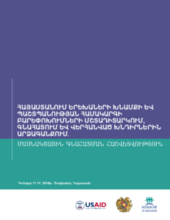This is the Armenian language version of the report.
The Armenian Ministry of Labor and Social Affairs (MOLSA), with funding and technical assistance from the Displaced Children and Orphans Fund (DCOF) of the United States Agency for International Development (USAID) and MEASURE Evaluation, conducted a self-assessment of the care reform system at a participatory stakeholder workshop held January 17–19, 2018, at the Tsakhkadzor Hotel Russia, in Armenia. The purpose of the assessment workshop was to bring together key stakeholders—decision makers, policy developers, service providers, civil society representatives, and donors—to assess and identify the main care reform areas in which action is needed. The assessment results aim to provide information to improve the implementation of care reform in line with the government’s international commitments and the National Strategy and Action Plan on Child Rights Protection in the Republic of Armenia for 2017‒2021.
The main findings of the assessment workshop are summarized by area of care, following the logic of the discussions. The report also summarizes findings by system components, followed by a summary of recommendations organized in the same way, to allow for the rapid identification of common issues for all areas of care that require immediate attention. The assessment results demonstrated that Armenia has a good regulatory framework that defines the standard process for referrals/admission of a child to an alternative care setting. The findings are organized around the following areas:
- Prevention of unnecessary separation of children
-
Foster care
-
Residential care
-
Supervised independent living
-
Formal kinship care
-
Informal kinship care
-
Adoption
-
Family reunification and reintegration
-
System deinstitutionalization
-
Crosscutting issues
-
Leadership and governance
-
Service delivery
-
Workforce
-
M&E and information systems
-
Social norms and practices
-
Financing

